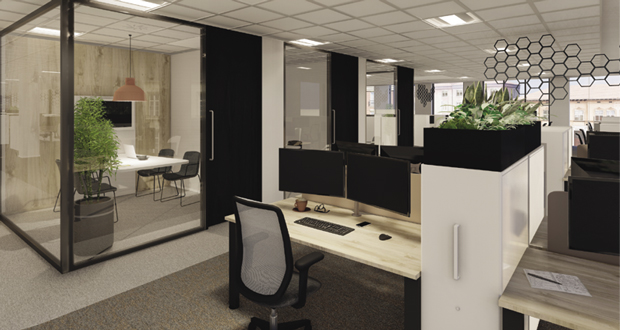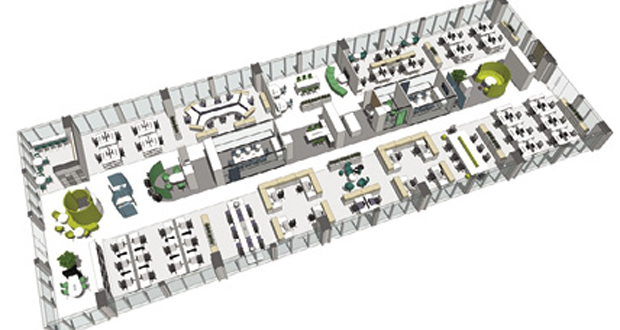WE ARE SOCIAL CREATURES
After months of very limited face-to-face contact we now know the true value of socialisation. Not seeing colleagues face-to-face, no matter how good the remote communicating technology, is an issue for most businesses and FMs will now be looking at ways to make the workplace home to be a very sociable experience.
While the experience of work will remain ‘socially distanced’ for some time, we can expect to see much greater focus given to sociability and community. The serendipitous chats at the coffee machine, the banter and the ability to ask a quick opinion are valuable parts of the social glue that binds teams together at work.
Instead of rows of desks and static work spaces, offices will need to become places where employees choose to be for the tasks they can’t complete at home. Re-imagining the workplace as a destination will involve the use of more dynamic and interactive zones that support knowledge sharing, socialisation, collaboration and staff engagement. When this is over, we will want to reconnect with our colleagues more than ever and workplaces must respond.
Most of us will have noticed that formality has left ‘work’ over the last few months. Once you have seen your boss or a client in their kitchen with the kids interrupting or a dog barking, working relationships won’t ever be the same. Up close and personal zoom calls have helped to make intimacy become a new business necessity. The acceptance, in these most exceptional of circumstances, of a more informal, almost intimate collaboration style with clients and colleagues is helping to break down some long-held business formalities. Increasing de-formalisation in the workplace may exponentially gain traction across sectors that have previously side-stepped the idea and will lead to much flatter and less hierarchical working styles, cultures and workplaces.
MINE NOT YOURS
We can also expect that with people less willing to share keyboards, headsets, chairs and even desks for fear of contamination – ‘owned spaces’ will become more important. In the short and medium term aftermath of a pandemic this makes perfect sense and will hopefully be a relatively short lived departure from the normal principles of the shared agile environment. For now, belonging through ownership may change the landscape of the workplace. For some organisations this will also be the perfect excuse to tidy up the detritus of office life – freeing up valuable space and helping to improve air quality too.
Minimising contact with surfaces will also become important; powered doors, sensor taps, smartphone-controlled coffee machines and access control systems will become more mainstream in the wake of COVID-19. Naturally bacteria-controlling and impregnated materials will be deployed where necessary to reduce infections.
A NEW SET OF WANTS
With an enforced period of reflection, employees will have questioned the long working days, the stress, missing out on family time, time spent travelling and the sedentary behaviours associated with their previous working lives. Consequently, when they do return to the office their experience must be frictionless and hugely positive. For example, if a team choose to come together in the office to collaborate on a project – they need to know they can book seating together, they can access shared resources and that technology connects seamlessly. If they can’t, they won’t go there.
Employers must provide uplifting working experiences and make coming back to work a pleasure. Good coffee and tea, healthy snacks, a robust COVID plan, detailed long term health and mobility plans, access to natural light and fresh air and a commitment to wellbeing, are also order of the day.
The needs-must approach to organisational agility from the last few months looks set to herald a new attitude that will continue in a post-virus, recession-era business world. While business leaders prepare for an economic downturn, facilities management professionals must guide their organisations as to what’s possible when it comes to true operational agility. Whether that decision making is motivated by cost savings or a desire to do things differently, the process starts with taking a close-up look at workplace occupancies and behaviours as well as overheads and property commitments. The real opportunity now lies in using COVID-19 as a catalyst for proactive change that will help firms stand-out, thrive, flex and adapt to whatever change comes next.
Jon Wilson has over 30 years of experience delivering award winning workplaces for a wide variety of clients. He has specific expertise in translating organisations’ needs, design objectives, business drivers and goals into workplace design.






